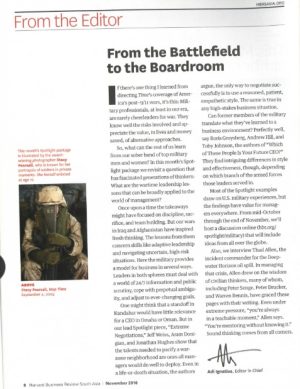From the Battlefield to the Boardroom
Published date: Mixed Paper Article
View PDFIf there’s one thing I learned from directing Time’s coverage of America’s post-9/11 wars, it’s this: Military professionals, at least in our era, are rarely cheerleaders for war. They know well the risks involved and appreciate the value, in lives and money saved, of alternative approaches.
So, what can the rest of us learn from our sober band of top military men and women? In this month’s Spotlight package we revisit a question that has fascinated generations of thinkers: What are the wartime leadership lessons that can be broadly applied to the world of management?
Once upon a time the takeaways might have focused on discipline, sacrifice, and team building. But our wars in Iraq and Afghanistan have inspired fresh thinking. The lessons from them concern skills like adaptive leadership and navigating uncertain, high-risk situations. Here the military provides a model for business in several ways. Leaders in both spheres must deal with a world of 24/7 information and public scrutiny, cope with perpetual ambiguity, and adjust to ever-changing goals.
One might think that a standoff in Kandahar would have little relevance for a CEO in Omaha or Oman. But in our lead Spotlight piece, “Extreme Negotiations,” Jeff Weiss, Aram Donigian, and Jonathan Hughes show that the talents needed to pacify a war-zone neighborhood are ones all managers would do well to deploy. Even in a life-or-death situation, the authors argue, the only way to negotiate successfully is to use a reasoned, patient, empathetic style. The same is true in any high-stakes business situation.
Can former members of the military translate what they’ve learned to a business environment? Perfectly well, say Boris Groysberg, Andrew Hill, and Toby Johnson, the authors of “Which of These People Is Your Future CEO?” They find intriguing differences in style and effectiveness, though, depending on which branch of the armed forces those leaders served in.
Most of the Spotlight examples draw on U.S. military experiences, but the findings have value for managers everywhere. From mid-October through the end of November, we’ll host a discussion online (hbr.org/spotlight/military) that will include ideas from all over the globe.
Also, we interview Thad Allen, the incident commander for the Deep-water Horizon oil spill. In managing that crisis, Allen drew on the wisdom of civilian thinkers, many of whom, including Peter Senge, Peter Drucker, and Warren Bennis, have graced these pages with their writing. Even under extreme pressure, “you’re always in a teachable moment,” Allen says. “You’re mentoring without knowing it.” Sound thinking comes from all corners.







